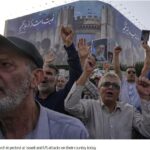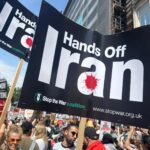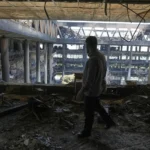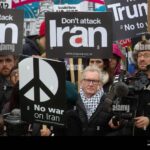
11th April 2016
Press Release
For Immediate Use
Solidarity organisation, the Committee for the Defence of the Iranian People’s Rights (CODIR), has today called for urgent action to defend press freedom in the Islamic Republic of Iran.
In particular, CODIR is concerned about the fate of Afrin Chitsaz, a journalist who was detained by the Iranian Revolutionary Guards Intelligence Agency, in November 2015, nearly six months ago.
Sources close to Chitsaz are concerned that since her arrest she has not been able to appoint a defence lawyer. There has been no news from her, although it is known she is being held in Tehran’s notorious Evin Prison. It is also not clear what the charges are against her and whether a date has been set for trial.
From Left to Right : Saman Safarzaei, Isa Saharkhiz, Ehsan Mazanderani and Afarin Chitsaz
Chitsaz is one of five journalists arrested in November last year. Three of the others, Isa Saharkhiz, Ehsan Mazandarani and Saman Safarzaei, were arrested along with Chitsaz on 2nd November 2015 by Iranian Revolutionary Guards Intelligence Agency. Davoud Asadi, is the other journalist arrested at around that time. The media credentials of some of the detainees are as follow:
- Isa Saharkhiz is an Iranian journalist, political figure, and former head of the press department at the Iranian Ministry of Culture and Education during former President Khatami’s administration
- Ehsan Mazandarani is the managing editor of the newspaper Farhikhtegan
- Afarin Chitsazregularly writes editorials on foreign policy for the newspaper ‘Iran’ and her columns have been carried by the official Islamic Republic News Agency, IRNA
Mazandarani, Asadi and Safrzaei were tried in late March on charges of “propaganda against the regime, insulting the leader and gathering and colluding with intent to harm national security” and are now waiting the ruling of the court on their sentences.
In addition, Saharkhiz has been accused of “spreading falsified information and insulting the head of the judiciary”, but the date of his court hearing has not been specified. Due to frequent seizures Saharkhiz was transferred from prison to hospital where he is now detained.
Ali Shamkhani, secretary of the Supreme National Security Council claimed last November that, “The journalists will be freed in no time.”
Almost six months later, however, they are still in detention and the authorities have not agreed to the release of the accused on bail.
With 36 journalists and citizen journalists incarcerated, Iran is one of the world’s five biggest prisons for media activists. In the World Press Freedom rankings in 2015, out of 180 countries Iran was ranked 173 in terms of its treatment of the press.
Solidarity organisation the Committee for the Defence of the Iranian People’s Rights (CODIR), which has campaigned for over 30 years to highlight human rights abuses in Iran, has stated that there is still much work to do on the human rights agenda.
CODIR Assistant General Secretary, Jamshid Ahmadi, stressed the significance of the international community continuing to support the campaign for human rights in Iran.
“The detention of these journalists is symptomatic of the fate of many fighting for freedom of expression inside Iran,” said Mr Ahmadi, “thousands of trade unionists and political activists are often detained without charge or for alleged ‘crimes’ which cannot be justified on any basis according to the laws of natural justice. The imprisonment of these journalists symbolises the attitude of the Islamic Republic to free speech.”
Human rights have not been on the agenda with the Iranian regime in the discussions around its nuclear programme, which resulted in sanctions being lifted recently. CODIR has expressed concern that this may be taken as carte blanche by the regime to act as it pleases on the domestic front, as long as it fulfils its international obligations.
“CODIR will continue its campaigning for human and democratic rights in Iran and it is here that we focus our attention,” continued Jamshid Ahmadi. “We welcome the lifting of sanctions and reduction of tensions between Iran and the rest of the world and in particular the US and the EU. However this should not be at the expense of liberty for Iranian human rights campaigners, democrats and peace activists.”
As CODIR has emphasised previously, human rights violations are part of a coordinated policy of the Islamic Republic of Iran, to maximise pressure upon human rights and trades union activists, their colleagues and family members, in order to pressurise the opposition movement in Iran.
ENDS
Note for Editors
Contact Information:-
Postal Address:
B.M.CODIR
London
WC1N 3XX
UK
Website: www.codir.net
E-mail: codir_info@btinternet.com
Further information for Editors
CODIR is the Committee for the Defence of the Iranian People’s Rights. It has been established since 1981 and has consistently campaigned to expose human rights abuses in the Islamic Republic of Iran.
CODIR has worked closely with the trade union movement in the UK, the peace movement, all major political parties and Amnesty International to press the case for an end to torture in Iran’s prisons.
CODIR has published Iran Today, its quarterly journal, since 1981, explaining the latest developments in Iran and the most effective way that the British public opinion could demonstrate its solidarity with the people of Iran.
In recent years CODIR has worked closely with Stop the War Coalition and has been vocal against any form of foreign intervention in the internal affairs of the nation.




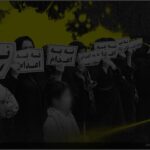


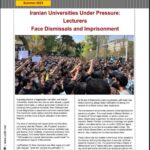
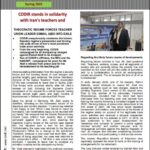




 Posted in
Posted in 

